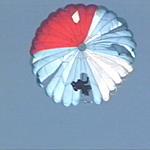by Todd Onken
 Our friend, Todd Onken, is a retired smokejumper1 for the U.S. Forest Service2. He and his wife have been living and traveling for three years in China where she teaches in a private school in Beijing, and he studies Chinese language and culture.
Our friend, Todd Onken, is a retired smokejumper1 for the U.S. Forest Service2. He and his wife have been living and traveling for three years in China where she teaches in a private school in Beijing, and he studies Chinese language and culture.
It’s only mid-July and already the western United States is once again suffering3 through another hot, dry forest fire season4. On this evening in McCall, Idaho I watch specially-equipped helicopters5 and airplanes returning from their day-long firefighting support duties fly low overhead as they land at the town’s small airport.6 The forest firefighters on the ground actually doing the sweaty, dirty work7 of putting out the flames now have the long night ahead of them to work on the fires without help from the aircraft. I know what it’s like to be out there in a wild part8 of the forested mountains working all night putting out fire because until just last summer, I was a smokejumper for 23 years.
Newspaper reports tell us that presently about 15,000 wild-land firefighters9 are working to put out forest fires burning in the western United States and Alaska. All have been trained to do their jobs safely and efficiently, and most think they are well-paid to do the hard and sometimes dangerous work. Most firefighters travel to their forest fire work assignments10 each day by truck, helicopter or simply by walking. A smokejumper is a special (some say “elite11”) type of forest firefighter, who parachutes12 from airplanes to work on fires in remote13, often mountainous areas. Because of the expensive parachute training and equipment required to deliver smokejumpers safely to a fire’s edge, only about 450 men and women of each summer’s firefighting workers are hired as smokejumpers.
The thrill14 of beginning a work shift15 by guiding16 my parachute to a safe landing near a forest fire after jumping from an airplane flying 160 km/hour is what initially17 attracted18 me to work as a smokejumper. Often I was able to land my parachute in a beautiful mountain meadow just a short walk from a fire’s edge. Sometimes gusty19 ground winds20 would drift my parachute to a landing in tall trees21, where I had to first rappel22 down a rope to the ground to go fight the fire, then return later to climb the trees and retrieve23 my torn24 parachute for repair and use for another jump. The worst parachute landings were the ones in which the winds, or poor parachute steering25 on my part, caused me to land among rocks and logs scattered on the ground. I was never badly hurt by such landings but did sprain26 my ankle once or twice.
Now that I’m no longer working as a smokejumper, what do I miss most about the job that I made my career? I miss working with my friends, men and women who are strong and physically fit27, and not afraid of hard work or a parachute jump into the mountains. I miss the airplane rides and parachute jumps into some of the most beautiful mountains and forests on Earth. But to tell you the truth, I don’t miss as much those long, smoky night shifts28 putting out fire.
Notes:
1. smokejumper;a person who parachutes from an airplane into an area where there is a fire to be put out (空降森林灭火员).
2. U.S. Forest Service: an agency of the U.S. government that oversees and protects the forested areas of the country (美国森林监护局).
3. suffering: being subjected to (something uncomfortable or unpleasant) (遭受).
4. fire season: the part of the year when the weather conditions cause fire to be more likely (火灾高发季节).
5. helicopters:直升机
6. On this evening in McCall, Idaho I watch specially-equipped helicopters and airplanes returning from their day-long firefighting support duties fly low overhead as they land at the town’s small airport.:夜晚,在爱达荷州的麦考尔,我在观察专门装备的直升机、飞机,在完成了一天的救火任务后返航,在我们头顶上空低低地飞翔,降落在城镇的小机场。
7. sweaty, dirty work: work requiring hard labor in often heated areas or conditions (又脏又累汗流浃背的工作).
8. wild part: an uninhabited area of a forest, or other natural area (荒野).
9. firefighters: 救火队员
10. work assignments: 分派的工作
11. elite: the most skilled type of forest fire fighter (佼佼者).
12. parachutes: 跳伞
13. remote: far removed from civilization or from inhabited areas (遥远的).
14. thrill: the excitement involved in doing a difficult and rewarding task (兴奋、激动).
15. work shift: the period of time during which one works at a job or assignment (工作时间).
16. guiding: directing the descent and direction of a parachute (操纵、驾驭).
17. initially: first attempt, or first time to do something (最初、一开始)
18. attracted:吸引
19. gusty: (指风) 一阵一阵的
20. ground winds: the movement of air at the surface of the ground (吹过地面的风).
21. drift my parachute to a landing in tall trees: 使我的降落伞漂移到大树间可以着陆的地方
22. rappel:(沿着一条绳子)往下滑
23. retrieve:取回
24. torn:撕破的
25. steering: guiding in a desired direction (驾驭)
26. sprain: 扭伤
27. fit: physically able to very demanding tasks or activities (身强力壮).
28. night shifts: work periods scheduled for night time (夜班).
Best Private Proxies…
I found a great……
Cheap Proxies…
I found a great……